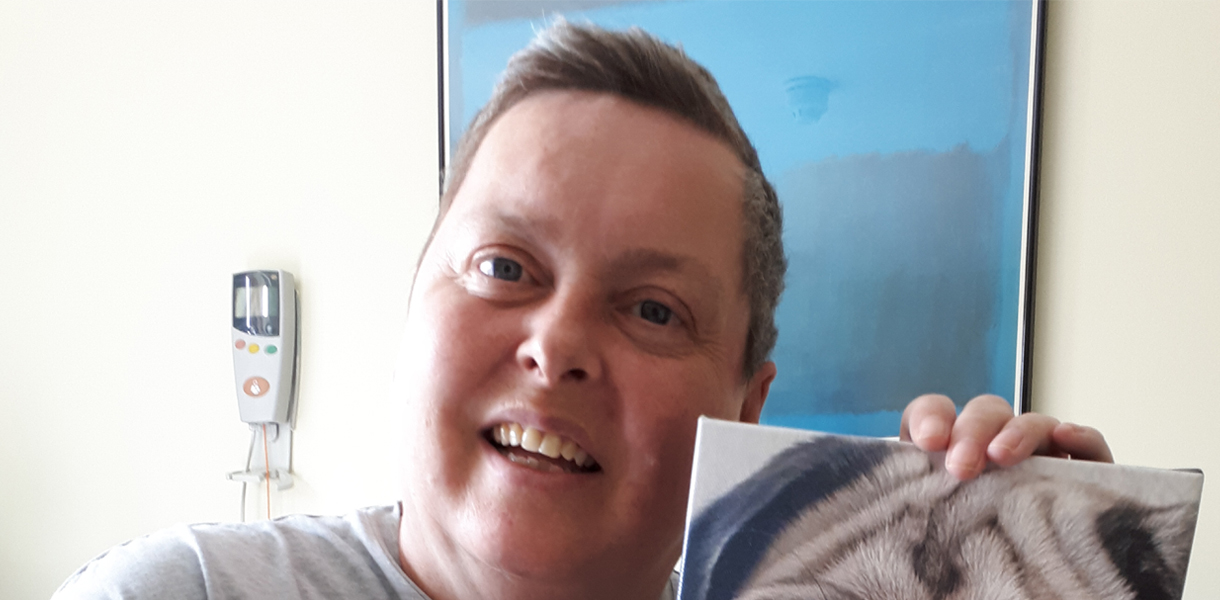Sarah, 45, is a Martlets outpatient. She has brain cancer and is currently living in a nursing home. Her two dogs, Patrick and Sally-Anne, have been an important part of her life.
“I had Sally-Anne right from a baby puppy. I just fell in love with her, she was so cute. Sally-Anne was all about life and she made me feel alive. She had so much energy; she also used to get up on the bed and nuzzle right into the duvet when I was underneath for a snuggle. I had another dog, Patrick, too – he was a schitzu and very old.
When I first got Sally-Anne I didn’t have cancer and I wanted to be there for her as you’d be there for your children. I wanted to look after her for the rest of her life and the rest of my life, but obviously that couldn’t happen which is heart-breaking, but I’m told she is in a good home.

Pet pals
Sally-Anne was such a comfort when I was first ill. However, she had so much energy she was always rushing around. If she saw another dog she’d get all excited and make her ‘wooo wooo woooof’ noise. I’d need two hands to keep her close on the lead. She was such a strong girl for her size.
To begin with, a charity called the Cinnamon Trust walked the dogs for me which was really helpful. I was confused and weak from the operation on the brain tumours. I had a couple of falls when I first got cancer. My parents were worried that the dogs would get under my feet and be dangerous. My family felt I couldn’t look after them so they arranged for Sally-Anne and Patrick to be re-homed by the Cinnamon Trust.
I think Patrick is in Penzance in their sanctuary (a retirement home for dogs). Sally-Anne went to a family home in Hertfordshire. I’ve asked to have a visit from Sally-Anne, but they don’t know if they can do it because she’s now living so far away. If you do want to see your pets again, it would be a good idea to state that you want them re-homed locally perhaps.
Your family obviously want to protect you and look after you when you’re ill. Still, it can be hard to know when’s the right time to re-home pets and what kind of support you need. It’s really important to talk about it. I’ll always have my Sally-Anne with me in my photos and in my heart.”
Niks Kent, Family and Support Team Manager at Martlets, helps patients and their families consider the care options for their beloved pets.
“Family and friends often bring patients’ pets into the hospice to visit their owners. It’s lovely to have pets here, alongside our Martlet’s cat who’s called Misty. If you come into Martlets as an inpatient for symptom management or respite care, even if it’s just for a weekend, it is important to think about who’s going to look after your pets during that time.
There’s an organisation called the Cinnamon Trust that can re-house your pets temporarily or permanently when you’re in a care home, hospital or hospice. They can even find dog walkers for you if you’re ill but staying at home. Borrow My Doggy is another great organisation who can connect you with another family who can walk your dog.
Heads and Tails
We can put our heads together to facilitate important conversations about who could look after a patient’s pets when they’re ill, or after they’re gone – whether it’s family, friends or a relevant organisations. Understandably, patients often want to keep a connection so they can see their pets right up to the end. Although this isn’t always possible.
It can be hard for the pets too. They can be confused and don’t know why their circumstances are changing. Many of these pets are elderly themselves as they’ve lived with the patients for many years. As well as dogs and cats, I’ve heard of people with reptiles that can live for 40 years so they need rehoming too!
Sometimes talking about pets and what will happen to them can help start a bigger conversation about preparing for end-of-life. This is so important, as planning ahead ensures patients and their loved ones – including their pets – are cared for in line with that person’s wishes, which is a comfort.”
Find out more about preparing for end-of-life:
Published 14/05/2019
